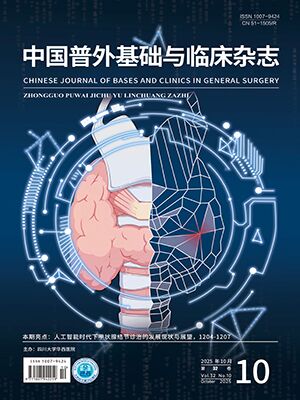Objective To research the effect of γ-ray released from 103Pd radioactive stent on the expression of Fas gene and its relation with apoptosis of cholangiocarcinoma cell and the significances through the establishment of human cholangiocarcinoma model.
Methods The model of nude mouse with implanted human cholangiocarcinoma was established. The mice were divided into study group and control group, 37 MBq 103Pd biliary stent was implanted in the study group and the ordinary metal biliary stent was implanted in the control group. The volume of tumor was measured, the cell apoptosis was detected by the TUNEL method and the expression of Fas gene of the cell apoptosis of the induced human cholangiocarcinoma was checked out by immunohistochemistry staining 10 d after the implantation.
Results Compared with the control group, the growing speed of the volume of tumor in study group was significantly reduced (P lt;0.05), the expression positive rate of Fas gene was significantly higher (P lt;0.05), and the apoptotic rate of cancer cells was also higher (P lt;0.01).
Conclusions The 103Pd radioactive stent can induce the cell apoptosis in nude mouse model with implanted human cholangiocarcinoma inhibit the cell growth of bile duct cancer and may promote the apoptosis of cancer cells by increasing the expression of Fas gene. It may be helpful for the further study of treatment for bile duct cancer using 103Pd radioactive stent.
Citation: ZHAO Xiaodan ,HE Guijin. Effect of 103Pd Radioactive Stent on Human Cholangiocarcinoma Cell Apoptosis and Expression of Fas Gene. CHINESE JOURNAL OF BASES AND CLINICS IN GENERAL SURGERY, 2010, 17(3): 224-228. doi: Copy
Copyright © the editorial department of CHINESE JOURNAL OF BASES AND CLINICS IN GENERAL SURGERY of West China Medical Publisher. All rights reserved




